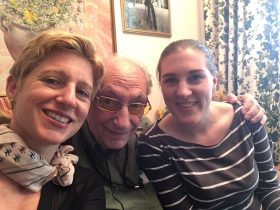The first entry in the series “Memories from the Life of Walter Frankenstein”

Walter Frankenstein with Anna Rosemann and Theresia Ziehe in Stockholm, 2017, Photo: Theresia Ziehe
I first had the pleasure of meeting Walter and Leonie Frankenstein in Stockholm in 2008. Back then, our meeting and the couple’s heartfelt partnership left a lasting impression on me. After 66 years of marriage, the Frankensteins still radiated love and a deeply held respect for each other. The author Klaus Hillenbrand, who tells the Frankenstein’s life story in Nicht mit uns (Not with Us), sums up this impression at the end of his book with a question he asks the couple: “Does ideal love exist?” Leonie looks at Walter. And Walter looks at Leonie. And then they give the shortest possible answer, as if speaking from one mouth: “Yes!”
At our first meeting, Walter and Leonie Frankenstein donated the first photo albums and documents to the museum. And after Leonie’s death in May 2009, Walter sought contact with us and gave further keepsakes, so that the entire body of items related to the couple is now in the Jewish Museum’s collection—consisting of more than 1,100 photographs, documents, and objects. This collection is remarkable particularly in terms of its photographs because it visually depicts Walter Frankenstein’s entire life and the historical events reflected in it. Walter was born in 1924 and grew up in Złotów (German: Flatow, now part of Poland). Due to anti-Semitic hostilities, in 1936 he was sent to the Auerbach Jewish Orphanage in Berlin, where he met Leonie. He completed an apprenticeship, then came forced labor. Leonie and Walter married in 1942. One year later, they decided to go underground. Their two sons were born in 1943 and 1944. All of them survived National Socialism. In November 1945, Leonie managed to emigrate to Palestine with the two boys. After working in a displaced persons camp in Greifenberg, Walter also tried to travel to Palestine, but he was detained on Cyprus. He was released in late summer of 1947 and the family was finally reunited. In 1956, they moved to Stockholm. Walter Frankenstein lives there to this day.
A six-part blog series, beginning with this entry, will examine the various stages of Walter Frankenstein’s life, illustrated by selected photographs. Simultaneously, we will publish numerous images in our online collections.
All of this required extensive preparation: All of the photographs were inventoried, opened to scholarship, and contextualized through extensive research. The most important basis for the time-consuming preparation of the collection were numerous meetings with Walter Frankenstein, and his trust in our work, for which we would like to offer him our heartfelt thanks. His impressive memory provided much context for individual photographs, including the names of those pictured.
Walter Frankenstein made it his life’s work to tell as many people as possible about his experiences. He frequently visits the Jewish Museum as a historical eyewitness. His wife is present at every event in the form of a large framed photographic portrait, which he begins by placing in a prominent location.
Theresia Ziehe, curator for photography, meets with Walter Frankenstein as often as she can in Berlin or Stockholm, and is always captivated by his life-affirming outlook. Anna Rosemann, a staff member involved with the collection, worked intensively with the inventory. In the following six blog entries, she writes about the stages of Walter Frankenstein’s life.
If you would like to learn more about Walter and Leonie Frankenstein’s life story, the book Nicht mit uns – Das Leben von Walter und Leonie Frankenstein (in German) by Klaus Hillenbrand is a good place to start. It was published in 2008 in Suhrkamp’s Jüdischer Verlag.
Thanks a lot, Walter Frankenstein for sharing the story of your life. And many, many thanks Anna Rosemann for making it available to readers everywhere in such an interesting and loving manner! We badly need to know about people like the Frankenstein family. Lest we forget.